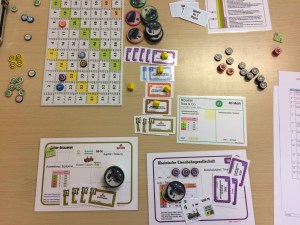Note: the game is still under development and will likely change. The version I played was 4.20
During the last Belgian 18xx Convention, I had an opportunity to play an upcoming Marflow title, 18DO: Dortmund. The game incorporates a parallel industry (beer).
There are two types of companies: classic railway corporations and breweries (private and public). The game is divided 6 sets of Stock Round + 2/3 Operating Rounds. Or rather 4/6 Operating Rounds, since they come in pairs: first railroads, then breweries.
There are two one-dimensional stock markets, one for public breweries, another for railroads. If I remember correctly, only president’s selling causes the price to fall. The game clearly isn’t about stock shenanigans.
Breweries have their own beer market, equipment (on back of the train cards), and investors which are sort of unique special powers. We didn’t use them a lot, but I imagine that normally they matter. Public breweries may have different share compositions
Game begins with simple bid for private breweries. Their minimal price and starting equipment vary. Later on, those breweries will be exchanged against president certificates of public beer companies.
Round track, bank pool, stock market. 0-30 track are used for the initial auction
Beer operating round
Private brewery, equipment, investors
Breweries produce beer. 2-level equipment generates two units of 2-level beer.
In order (determined by the equipment if private or the stock value if public), the beer is sold to the market. Blue cubes represent demand of certain level (that can be fulfilled be any beer whose level is not lower). There are two section of customers: regulars and new ones. The former are served first and pay more. The later, once supplied, become regulars.
Instead of being sold to the market, the beer can be loaded onto the appropriate trains. Those trains will make more money if they run through Dortmund. That export action is profitable for the brewery as well—it pays more than any customer.
Breweries then can buy new equipment and investors. Upon phase changes, lowest-level customers are removed (making same-value equipment useless).
Private breweries must pay 50/50, their president can help them buy stuff with personal cash.
The order in those rounds was very important, because quickly the supply exceeded the demand.
Railroad operating roundClassic OR except that on most city/town hexes a coal/steel marker may be placed. This increases the value of the stop and is mandatory if one wants to upgrade the tile. Those markers can be upgraded as well. Both their placement and upgrade cost $30, removes the cheapest available train (but doesn’t trigger a phase change) and creates new regular and/or future customers.
S – steel, K – coal
Intersections of the two industries
– cards are double-sided (equipment/train)
– breweries may load beer onto trains
– railroads may add customers upon placing/upgrading coal/steel markers
My impressions
First, the game felt one SR-OR set too long (in fact we didn’t play the last one). The game is operational which isn’t to my taste. I didn’t have an impression that the map mattered, but it might have been caused by the novelty of beer operating rounds; we were naturally more interested in them. Said operating rounds were quite clever and really smooth which is nice. Another thing I liked was the train rush accelerated by placing/upgrading coal/steel markers.
Overall I felt like I was playing a eurogame.







